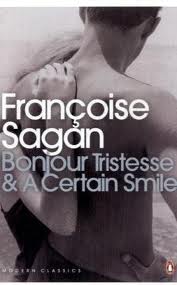 Staff Review by Chris Saliba
Staff Review by Chris SalibaFrancois Sagan’s extraordinary 1954 debut novel Bonjour Tristesse is a brilliant psycho-sexual chess game that plays with ideas of sex, freedom, pleasure, power and responsibility in a three way relationship between a father, his daughter and fiancé. It’s written with wit and a withering sense of irony, with some brilliantly executed comic scenes.
It’s irrelevant to discuss an author’s age in regards to their literary output, but it’s hard to ignore the fact that Francois Sagan published the extraordinary Bonjour Tristesse when she was only 18. It seems an impossible feat, so accomplished is this small, polished gem. The novel is basically a witty yet tense psychological stand-off between a young 17-year-old teenager and her father’s fiancé.
Celeste, the novel’s narrator, lives on the French Riviera with her father and his mistress, Elsa Mackenbourg. They live in a kind of carefree, idyllic, almost irresponsible existence. Celeste and her father, Raymond, are like conspirators in their quest to live only for pleasure, rather than as typical head-of-the-house father and dutiful daughter. They both take lovers more for kicks and excitement than to satisfy any sort of deep emotional need. Elsa, Raymond’s mistress, is seen as a frivolous but fun diversion, while Celeste takes on the 26-year-old student Cyril as a lover. She doesn’t love him, but savours the physical aspects of the relationship. As in Oscar Wilde, it’s all about surfaces and sensations. In one delicious passage, Celeste describes how she likes to drink coffee for breakfast, followed by a piece of orange, then followed again by coffee. Both Celeste and Raymond are clearly, to use Lady Bracknell’s disapproving phrase, living entirely for pleasure.
Enter Anne Larsen. She is a friend of Celeste’s late mother, and is temperamentally the opposite of the Dionysian Raymond and Celeste. Anne is entirely Apollonian. She likes order, control and is morally upright. Her irresistible nature soon overpowers Raymond and the two are engaged to be married. Celeste is not wholly against Anne. She admires certain of her qualities, but nonetheless sets herself the task of breaking up her father’s new serious relationship. (Carelessly he has abandoned Elsa.) Her strategy to achieve this break-up is to make Anne jealous. She dragoons Cyril and Elsa to play a few little set pieces as lovers, this in the hope that it will make Raymond impossibly jealous. (Anne had previously told Celeste she was not to see Cyril anymore, so to all intents and purposes the relationship was on hold.)
This game of trying to manufacture jealousy, destroy a relationship and hopefully restore earlier idyllic days of pleasure, comes to a tragic end, but without compromising the novel’s sophisticated, witty and ironic tone. Celeste ends her story by reflecting on the sad events that she was the main protagonist for by wistfully saying to herself ‘ bonjour tristesse’, or hello sadness in English.
This is a brilliant and original psycho-sexual chess game of fascinating dimensions. It plays with ideas of sex, freedom, pleasure, power, responsibility and the three way relationship between a daughter, her father and her father’s lover. A fourth main character is perhaps Celeste’s dead mother. She’s never present, but we are constantly reminded of her by the presence of her interloper, the compelling and perhaps too powerful Anne Larsen. Something is clearly wrong in Celeste’s world, where morality, order and a proper father-daughter relationship are on hold. What the novel is trying to tell say is anyone’s guess, but its colour, wit, playfulness and sexual power plays make it irresistible.
Bonjour Tristesse and A Certain Smile, by Francois Sagan. Published by Penguin. ISBN: 9780141442303 RRP: $24.95
No comments:
Post a Comment